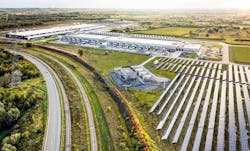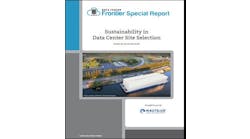As it expands its cloud computing operations in the Southeast, Google is investing in solar power to provide renewable energy to support its data centers. Google said today that it will purchase the output of several new solar farms as part of a deal with the Tennessee Valley Authority (TVA), totaling 413 megawatts of power from 1.6 million solar panels — the equivalent of 65,000 home rooftop solar systems.
The new solar generation projects in Hollywood, Alabama and Yum Yum, Tennessee will be able to produce around 150 megawatts each, and be the largest solar farms ever to be built for Google. They will support new Google data centers under construction in Clarksville, Tennessee and Jackson County, Alabama.
Today’s announcement showcases two areas where Google has been a pacesetter – using cloud growth to boost green power generation, and expanding data center infrastructure in the Southeastern U.S.
Google has taken a leadership position in procuring renewable energy to power its data centers, lining up 30 long-term power purchase agreements (PPAs) have resulted in nearly $5 billion in global investment in renewable energy.
“Last year, we shared our long-term objective to source carbon-free electricity around the clock for each of our data centers,” said Amanda Corio, Senior Lead, Energy & Infrastructure for Google. “These new solar projects will bring us substantially closer to that goal in the Southeastern U.S.”
Southeast Strategy
Google was the first hyperscale operator focusing a large chunk of its computing power in the Southeastern United States. The strategy appears to be driven by the region’s attractive economics and Google’s interest in retooling existing power-intensive industrial infrastructure.
As an example, Google’s site in Widows Creek, Alabama is a former coal power plant operated by the Tennessee Valley Authority, which creates some interesting possibilities in energy procurement.
“At Widows Creek, we can use the plants’ many electric transmission lines to bring in lots of renewable energy to power our new data center,” said Patrick Gammons, Senior Manager of Data Center Energy and Location Strategy at Google, when the site was announced in 2016. Today’s announcement with the TVA represents the fulfillment of that goal.
Other hyperscale operators have since followed suit and expanded into the Southeast, include a Facebook data center near Atlanta.
Google says the deal also brings significant benefits to the communities where it operates data centers. “Deploying solar farms does more than provide a cost-effective way to procure clean power,” said Corio. “It will also create economic benefits for Tennessee and northern Alabama. TVA’s developer partners—NextEra Energy Resources and Invenergy — will hire hundreds of workers in the region, make long-term lease payments to property owners, and generate millions of dollars in economic activity and tax revenue for the broader community.”
Commitment to Solar
Cloud computing has emerged as a surprising force for the commercialization of renewable energy at Internet scale. Despite the Trump administration’s decision to withdraw the United States from the Paris Agreement on climate change, the data center industry is continuing to lead the shift to renewable energy to power the Internet economy, with Google, Amazon, Microsoft and Apple are all committed to sourcing renewable energy to power their cloud data centers.
Some examples of the trend:
- In 2018 Facebook announced power purchase agreements for 1,850 megawatts of renewable energy, as part of its larger commitment to sustainable operations.
- In addition to its power purchase agreements, Microsoft has pioneered a strategy called volume firming agreements that reduce the impact of intermittency and weather-related pricing risk, which are significant challenges in structuring renewable power agreements at utility scale.
- Amazon Web Services has made a series of investments in solar and wind power in Virginia, Indiana, North Carolina and Ohio.
- Apple says it has invested in 25 renewable energy projects around the globe, totaling 626 megawatts of capacity, including enormous solar farms around its data center in Maiden, North Carolina.
- In 2018 Switch announced a 1 gigawatt solar energy project in Nevada to support its data center operations for large users.
Many of these purchases by hyperscale data center providers have created new production of clean energy, as opposed to credits for use of clean energy from existing sources. This “additionality” is a key strategic priority for Google and several other large cloud customers, who want their investments to support a longer-term shift away from fossil fuel.






